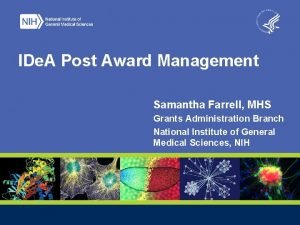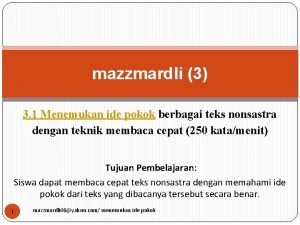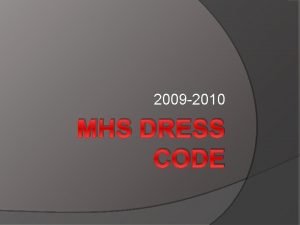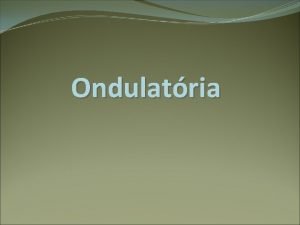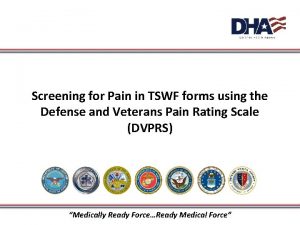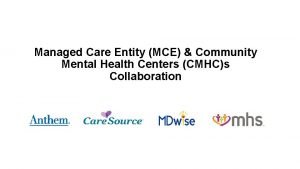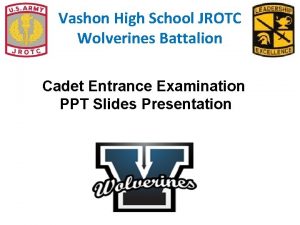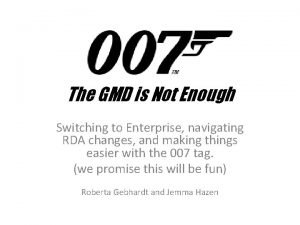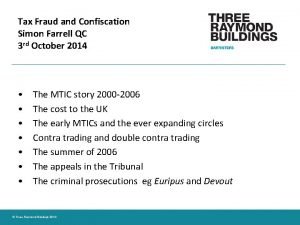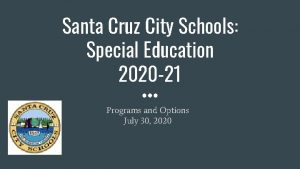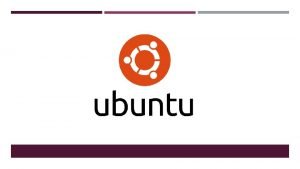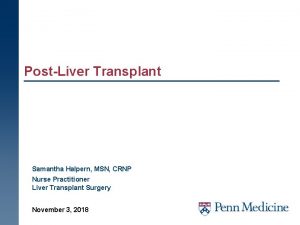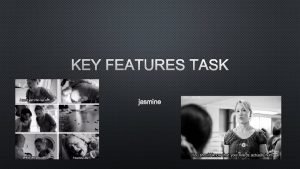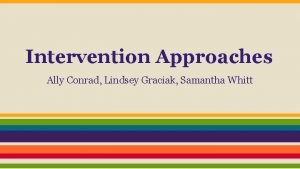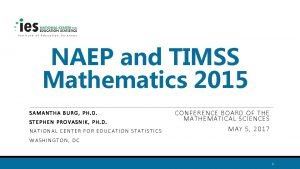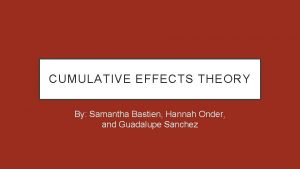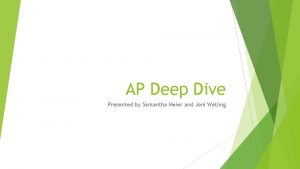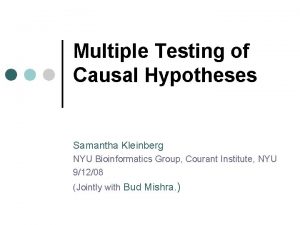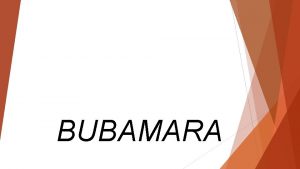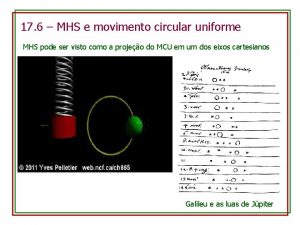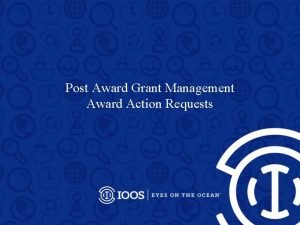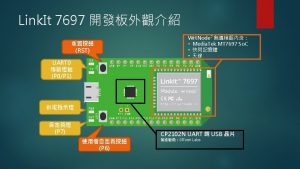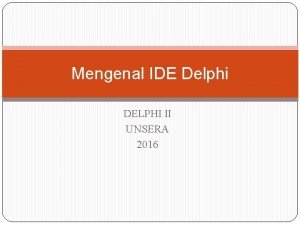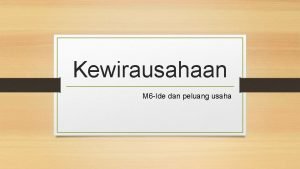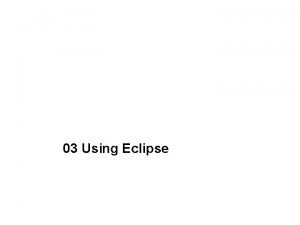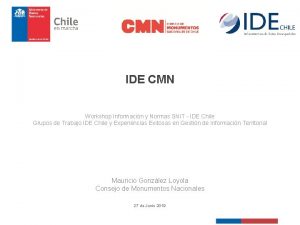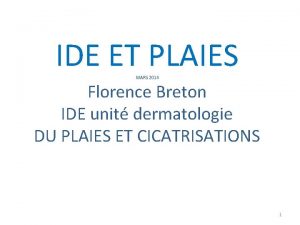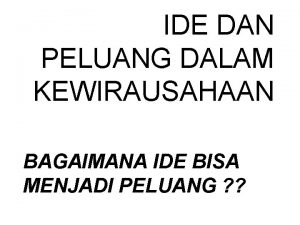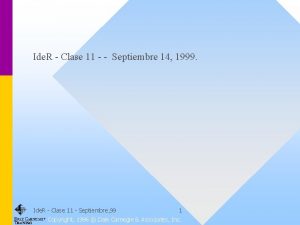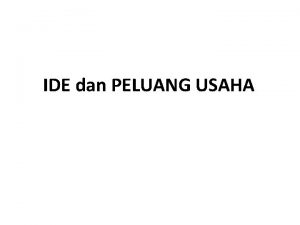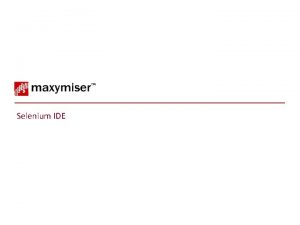IDe A Post Award Management Samantha Farrell MHS












































- Slides: 44

IDe. A Post Award Management Samantha Farrell, MHS Grants Administration Branch National Institute of General Medical Sciences, NIH

IDe. A Post Award Management • • • IDe. A Policy Reminders Questionable Costs Annual Performance Reporting Requirements Prior Approvals NIH Updates and Policy Reminders Q&A

IDe. A Policy Reminders 3

IDe. A Policy Reminders • No IDe. A grant funds awarded to an IDe. A-eligible institution may be transferred via subcontract to a consortium partner institution in a non-IDe. A state. • IDe. A funds may be used in other IDe. A and non-IDe. A states for fee-for-service type of activities that include activities associated with collaborative projects, research education and training, sample and data analysis, workshops, etc. • INBRE investigators of research projects or pilot projects may not receive simultaneous research project support from a COBRE program and vice versa. • COBRE and INBRE PIs may not receive any research support from any COBRE or INBRE program.

Questionable Costs 5

Questionable Costs • Honorarium – unallowable when the primary intent is to confer distinction on, or to symbolize respect, esteem, or admiration for, the recipient of the honorarium; a payment for services rendered is allowable • Stipends – only allowable on training grants; unallowable on IDe. A grants; “Compensation of Students” is allowable • • Housing – not allowable on NIH grants; Travel costs are okay • Meals/Food – only allowable as part of meeting necessary for disseminating information; must be consistently treated and reasonable; grantee must have a written meal policy in place • • Scholarships – not allowable on NIH grants General Supplies – only costs directly related to the grant and/or project are allowable as direct costs Costs with Poor Justification – not including adequate detail or using confusing terms in the budget justification narrative

Annual Performance Reporting Requirements 7

Annual Performance Reporting Requirements Research Performance Progress Report (RPPR) • Annual progress reports for non-SNAPs are due two months (60 days) prior to the anniversary date • Failure to submit complete and timely progress reports may affect future funding to the organization • Grantees may access a list of progress reports that are due by using o The Status page in e. RA Commons, and selecting the Tab "List of Applications/Grants” o Enter your IPF number on this site - https: //public. era. nih. gov/chl/public/search/progress. Report. By. Ipf. era

Annual Performance Reporting Requirements Research Performance Progress Report (RPPR) • Must include the overall section and separate components for each core, research project, and pilot project • Each component in the RPPR o Reports on the progress of that particular core or project during the current budget period o Requests funds to be used during the next budget period • If you are only reporting progress because the research or pilot project has ended, you do not include a budget for that component RPPR Instructions Section 7. 6 Multi-Project RPPRs: https: //grants. nih. gov/grants/rppr_instruction_guide. pdf

Annual Performance Reporting Requirements • Scientific Information Reporting System (SIRS) o SIRS. nigms. nih. gov – NOT accessed through e. RA Commons o Due the same time the RPPR is due • • Human Subjects System (HSS) data (formerly IMS) Inclusion Reports o Submitted with the RPPR submission (prompted to access HHS when completing the RPPR) • Progress Report Additional Materials (PRAM) o Must be initiated by the Grants Management Specialist o Allows additional information to be submitted via the e. RA Commons

Prior Approvals 11

Prior Approvals NIH Grants Policy Statement Sections • 8. 1 Changes in Project and Budget https: //grants. nih. gov/grants/policy/nihgps/HTML 5/section_8/8. 1_cha nges_in_project_and_budget. htm • 8. 1. 1 NIH Standard Terms of Award https: //grants. nih. gov/grants/policy/nihgps/HTML 5/section_8/8. 1_cha nges_in_project_and_budget. htm#NIH_Standard_Terms_of_Award • 8. 1. 2 Prior Approval Requirements https: //grants. nih. gov/grants/policy/nihgps/HTML 5/section_8/8. 1_cha nges_in_project_and_budget. htm#Prior • 8. 1. 3 Requests for Prior Approval https: //grants. nih. gov/grants/policy/nihgps/HTML 5/section_8/8. 1_cha nges_in_project_and_budget. htm#Requests

Prior Approvals The following are some Prior Approvals frequently requested for IDe. A grants: • • Carryover of Unobligated Balances • Addition of new pilot projects and changes to currently approved pilot projects Change of Key Personnel Change of Scope Addition of new research projects and changes to currently approved research projects

Carryover of Unobligated Balances • IDe. A grants do NOT have automatic carryover • Prior approval is required to use unobligated funds from a previous budget period during the current budget period

Carryover Requests A carryover request should include the following: • • • Explanation of why there is an unobligated balance • Budget and justification pages (PHS 398 or SF 424), including any subcontract sites • • Calculation of F&A costs (checklist page of PHS 398 or SF 424) • Equipment quotes, if appropriate Justification of why carryover funds are needed in the current year If the request will generate recurring costs in future years, an explanation of how costs will be supported without future use of unobligated balances or new supplemental funding Appropriate Just In Time (JIT) documents (e. g. , biosketches for new key personnel, other support, human subjects education certification)

Reasons Why Carryover Requests are Delayed or Rejected • The prior year Federal Financial Report (FFR) has not been received and approved by NIH • The request was not signed by or sent through an Authorized Organization Representative (AOR) • • Requested costs duplicate costs in the current year’s award • • Unallowable costs were included • • Carryover request does not reflect immediate needs Unlikely that carryover funds can be spent in the budget period they are requested Use of the carryover funds are not within the currently approved scope of the grant No plan to support recurring costs in future years

Change of Key Personnel • Prior approval is required for the following changes regarding of the PI and any Key Personnel named on the Notice of Award: o Reduction in effort of 25% or more of the originally approved effort level o Reduction in effort that would bring the person below the required minimum effort level o Withdrawal from the project entirely o Be absent 3 months or more o Replacement of Key Personnel

Change of Key Personnel A request for changes to key personnel must include: o The reason for the request (leaving/joining/replacing) o Justification for selection of the person o Level of effort and duties to be performed o Explanation of any changes to the budget or scope of the grant o Biographical sketch for new person o Updated other support for new person o Human subjects education if person is involved in the design and conduct of human subjects work

Change of Scope • Change in Scope is a change in direction, type of training, or other area that constitutes a significant change from the aims, objectives, or purpose of the originally approved project • A change of scope always requires prior approval • NIH Grants Policy Statement Section 8. 1. 2. 5 Change of Scope

Change of Scope Potential indicators of a change in scope: o Change in the specific aims approved at the time of award o Change from the approved involvement of human subjects o Change from the approved use of live vertebrate animals o Substitution of one animal model for another o Shifting research emphasis from one disease area to another o Applying a new technology; i. e. , changing assays from those approved to a different type of assay o Transfer of performance of substantive programmatic work to a third party o Change in other senior/key personnel not specifically named in the No. A o Significant rebudgeting of 25% or more in a single direct cost budget category o Purchase of a unit of equipment exceeding $25, 000

Changes of Human Subjects and Vertebrate Animals Involvement • Changes of human and vertebrate animal involvement are usually a change of scope and therefore require prior approval • For IDe. A grants, changes to human subjects and vertebrate animals involvement are usually due to research and pilot projects • The required prior approval items for both human subjects and vertebrate animals are submitted as part of the prior approval request for research and pilot projects

IDe. A Research and Pilot Projects Official approval from NIGMS is required prior to the commencement of any new research project or pilot project • COBRE I and II : research and pilot projects • COBRE III and IDe. A-CTR : pilot projects only • INBRE : research and pilot projects

Addition of Research Projects – COBRE I and II Prior to the commencement of any new research project, the following documentation must be submitted to NIGMS staff: • Research project proposal. Using PHS 398 forms and instructions, only the following sections have to be submitted: – Face Page – Project Summary (Page 2) – Research Strategy Section • External Advisory Committee approval - communication from the EAC chair (at a minimum) indicating that the EAC concurs with supporting the research project • Biographical Sketch of Research Project PI Terms • Updated other support of Research Project PI of the • Detailed Budget with justification No. A • Checklist Format Page with F&A cost breakdown • PHS FORMS E - Human Subjects and Clinical Trials Information Form and IRB approval (if applicable) • IACUC approval and Vertebrate Animal Section (if applicable)

Addition of Pilot Projects – COBRE I, III, and IDe. A-CTR Prior to the commencement of any pilot project, the following documentation must be submitted to NIGMS staff per NOT-GM-14 -111 (http: //grants. nih. gov/grants/guide/notice-files/NOT-GM-14 -111. html): • Pilot project proposal. Using PHS 398 forms and instructions, only the following sections have to be submitted: – Face Page – Project Summary (Page 2) – Research Strategy Section • External Advisory Committee approval - communication from the EAC chair (at a minimum) indicating that the EAC concurs with supporting the pilot project. • PHS FORMS E - Human Subjects and Clinical Trials Information Form and IRB approval (if applicable) • IACUC approval and Vertebrate Animal Section Terms of the (if applicable) No. A

Addition of Research and Pilot Projects – INBRE Prior to the commencement of any developmental research project and pilot project, the following documentation must be submitted to NIGMS staff: • Developmental Research Project/Pilot Project proposal. Using PHS 398 forms and instructions, only the following sections have to be submitted: – Face Page – Project Summary (Page 2) – Research Strategy Section • External Advisory Committee approval - communication from the EAC chair (at a minimum) indicating that the EAC concurs with supporting the developmental research project/pilot project. • PHS FORMS E - Human Subjects and Clinical Trials Information Form and IRB approval (if applicable) Terms of • IACUC approval and Vertebrate Animal Section the No. A (if applicable)

Requests for Prior Approval • Requests for actions that require prior approval must be submitted by an Authorized Organization Representative (AOR) to the NIGMS Grants Management Specialist and Program Officer no later than 30 days before the proposed change • NIGMS tries to respond to all prior approval requests within 30 days of receiving all necessary information from the grantee

When Prior Approval is Not Needed Changes to the Budget NIH prior approval is not required to rebudget funds for any direct cost item that the applicable cost principles identify as requiring the Federal awarding agency’s prior approval, unless the incurrence of costs is associated with or is considered to be a change in scope. o Incur pre-award cost up to 90 days before the beginning date of the initial budget period of a competing or non-competing award o Initiate a one-time extension of the final budget period of a previously approved project period without additional funds (a. k. a First No-Cost Extension) o Rebudget among budget categories o Rebudget between direct and F&A costs o Add, change, or remove a domestic consortia site o Provide subawards based on fixed amounts, provided that the subawards meet the requirements for fixed amount awards in 45 CFR 75. 201

When Prior Approval is Not Needed 8. 1. 2. 5 Change of Scope section of the NIH GPS includes a list of potential indicators of a change in scope • Transfer of the performance of substantive programmatic work to a third party through a consortium agreement, by contract, or any other means* • Change in other senior/key personnel not specifically named in the No. A • Significant rebudgeting, whether or not the particular expenditure(s) require prior approval. Significant rebudgeting occurs when expenditures in a single direct cost budget category deviate (increase or decrease) from the categorical commitment level established for the budget period by 25 percent or more of the total costs awarded (does not apply to modular grants) • Purchase of a unit of equipment exceeding $25, 000 If there is no change of scope, then prior approval is NOT required *Unless the third party is a foreign component – addition of a foreign component always requires NIH prior approval

When Prior Approval is Not Needed Level of Effort Changes do not require prior approval if: • • The personnel are not named on the Notice of Award • The departure or addition of personnel does not result in a change of scope The personnel are not required to maintain a minimum level of effort (e. g. Pilot Project PIs)

If you aren’t sure if prior approval is needed… • Consult the following information sources before implementing the change or requesting prior approval: o Check the NIH Grants Policy Statement on Prior Approvals o Ask your Sponsored Programs Office / AOR o Ask your Program Officer o Ask your Grants Management Specialist

NIH Updates & Policy Reminders 31

Notice of Award (No. A) TL: DR $ $ ! s i h $ $ t o $ $on’t d D Notice of Award issued for your grant

Notice of Award (No. A) • PLEASE read your No. A! • The No. A is the official notification of funding but it is more than just money

Notice of Award (No. A) • The No. A is a legally binding document that contains: o Award Data & Fiscal Information o Grant Payment Information o Terms and Conditions • • • 45 CFR Part 75 NIH Grants Policy Statement Program legislation and program regulations Federal Award Performance Goals Special terms and conditions as cited in No. A

Notice of Award (No. A) • Review the No. A carefully, including SECTION IV – GM Special Terms and Conditions o Specific requirements, restrictions, and policies that pertain to that particular award • The grantee indicates acceptance of the terms and conditions of the award by drawing down funds against the grant from the Payment Management System

Grant Closeout Requirements NIH GPS 8. 6 Closeout: Recipients must submit the all closeout documents within 120 calendar days of the end of the period of performance (project period) o Final Research Performance Progress Report (F-RPPR) o Final Invention Statement and Certification (FIS) o Final Federal Financial Report (FFR) – must ensure that there are no discrepancies between the final FFR expenditure data (in e. RA Commons) and the FCTR in the PMS

Grant Closeout Requirements • HHS policy requires NIH to initiate unilateral closeout procedures within 180 days of the period of performance end date if any of the closeout reports are not timely and acceptable • Other enforcement actions, such as withholding of further awards, can also be taken

Interim and Final Progress Reports • NOT-OD-17 -022: The Final Research Performance Progress Report (F -RPPR) has replaced the Final Progress Report (FPR) for closeout • The general format is the same as the interim/annual RPPR • Recipients are required to report on Project Outcomes • Due dates have not changed • NOT-OD-17 -037: Implementation of the Interim-RPPR while a Renewal Application is Under Consideration - Effective 02/09/2017 • Old policy - whether funded or not, the progress report contained in the renewal (Type 2) application may serve in lieu of a separate final progress report – If the recipient organization has submitted a renewal application on or before the date by which a Final-RPPR would be required for the current competitive segment, then submission of an Interim-RPPR via e. RA Commons is required no later than 120 calendar days from the period of performance end date • If the renewal application is funded, NIH will treat the Interim-RPPR as the annual performance report for the final year of the previous competitive segment. • If the renewal application is not funded, the Interim-RPPR will be treated by NIH staff as the institution's Final-RPPR.

Human Subjects System (HSS) • NOT-OD-18 -179: Transition from Inclusion Management System (IMS) to New Human Subjects System (HSS) as of June 9, 2018 • Consolidates human subjects and clinical trial information in one place • • NIH migrated enrollment records previously in IMS to HSS • https: //era. nih. gov/hss_overview. cfm PIs and SOs can access HSS via a Human Subjects link in the Status section of e. RA Commons and via a Human Subjects link in the RPPR section of e. RA Commons

Clinical Trials • NOT-OD-16 -148: Expects all NIH-funded investigators and staff who are involved in the conduct, oversight, or management of clinical trials be trained in Good Clinical Practice (GCP) – Effective 01/01/2017 • NOT-OD-16 -149: Expects all NIH-funded clinical trials are registered and that results are submitted to Clinical. Trials. gov whether or not subject to FDAAA – Applies to grants, contracts, and intramural clinical trials submitted on or after 01/18/2017 • NOT-OD-17 -043: All grant applications with plans to conduct clinical trials must be submitted in response to an FOA which specifically states that clinical trials are allowed – Effective 01/25/2018 • NOT-OD-17 -114: Active FOAs with due dates on or after 01/25/2018 were updated to state whether clinical trial are or are not allowed

Clinical Trials • If there is a research or pilot project on an IDe. A award, additional information and documentation will be required when it is submitted for prior approval to NIGMS • Terms specific to each clinical trial will be included in SECTION IV – GM Special Terms and Conditions on the No. A

NIH Forms NOT-OD-17 -119: New NIH "FORMS-E" Grant Application Instructions Available for Due Dates On or After January 25, 2018 o Consolidation of human subjects, inclusion enrollment, and clinical trial information previously collected across multiple agency forms o Expansion and use of discrete form fields for clinical trial information o Incorporation of recent Grants. gov changes to R&R Budget and SBIR/STTR Information forms • Make sure you are using the current forms for all applications and prior approval requests

Questions Specific to Your Grant • Before you contact NIH staff, review the following sources of information as they will likely contain the answers to many of questions you may have: o The Terms and Conditions in the No. A for your grant o The specific program announcement that your application was submitted under o The NIH Grants Policy Statement o Your AOR in your institution's grants and contracts office o The NIH grants management specialist (policy/budget issues) or scientific program officer (policy/technical issues) listed in the last section of the Notice of Award for your grant and in e. RA Commons

Questions? NIGMS GAB DRCB Team Christy Leake Christy. Leake@nih. gov GAB DRCB Team Leader Grants Management Specialists IDe. A State Assignments Arina Kramer Arina. Kramer@nih. gov Montana, New Hampshire, Oklahoma, South Dakota Brian Iglesias Brian. Iglesias@nih. gov Alaska, Nevada, North Dakota, Rhode Island Courtney Tardd-Wright Courtney. Tardd. Wright@nih. gov Nebraska, Kansas, West Virginia, Vermont Emily Tran Emily. Tran@nih. gov Delaware, Maine, Mississippi, New Mexico Lisa Hildred Lisa. Hildred@nih. gov Arkansas, Hawaii, Idaho, South Carolina Samantha Farrell Samantha. Farrell@nih. gov Kentucky, Louisiana, Puerto Rico, Wyoming
 Pre award vs post award
Pre award vs post award Samantha marie ide
Samantha marie ide Bagaimana anda mendefinisikan ide-ide melalui outline
Bagaimana anda mendefinisikan ide-ide melalui outline Gagasan yang menjiwai suatu paragraf disebut
Gagasan yang menjiwai suatu paragraf disebut Post award contract management
Post award contract management Mhs dress code
Mhs dress code Equações de lagrange
Equações de lagrange Tswf-mhs
Tswf-mhs Movimento
Movimento Mhs vs mdwise vs anthem vs caresource
Mhs vs mdwise vs anthem vs caresource Mhs hurricane battalion
Mhs hurricane battalion Mhs sentral
Mhs sentral How to post award in philgeps
How to post award in philgeps Simon farrell qc
Simon farrell qc Stacy o'farrell santa cruz
Stacy o'farrell santa cruz Christ be our light bernadette farrell
Christ be our light bernadette farrell Byron farrell
Byron farrell Enteralite infinity no flow out
Enteralite infinity no flow out Detroit matchmaker
Detroit matchmaker Who is farrell jarreau
Who is farrell jarreau Samantha zammit
Samantha zammit Samantha halpern
Samantha halpern Samantha latorres
Samantha latorres Samantha boland
Samantha boland Samantha riou
Samantha riou Cyberbully taylor hillridge
Cyberbully taylor hillridge John towner williams
John towner williams John williams barbara ruick
John williams barbara ruick Intervention conrad
Intervention conrad Samantha winslow john williams
Samantha winslow john williams Samantha aigner-treworgy
Samantha aigner-treworgy Site:slidetodoc.com
Site:slidetodoc.com Samantha burg
Samantha burg Samantha kepler
Samantha kepler Cumulative effects theory
Cumulative effects theory Samantha hung
Samantha hung Samantha meier
Samantha meier Samantha kieffer
Samantha kieffer Samantha formica
Samantha formica Samantha haviland
Samantha haviland Samantha figueroa ct
Samantha figueroa ct Samantha slama
Samantha slama Portuguese man of war habitat
Portuguese man of war habitat Samantha kleinberg
Samantha kleinberg Samantha dooley
Samantha dooley

